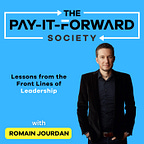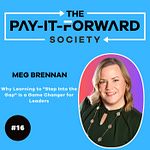The world of work has undergone a seismic shift in recent years, with distributed teams becoming the norm rather than the exception. As leaders, we need to adapt our approach to ensure our teams remain engaged, aligned, and productive in this new environment. In a recent episode of The Pay It Forward Society, I had the privilege of speaking with Brian Elliott, one of Forbes' "Future of Work 50," who shared invaluable insights on leading distributed teams effectively.
Brian emphasized that the key to success in this new world of work is flexibility and intentionality. "It's not about where, it's not about when, it's about how you actually operate as an organization," he explained. "There are these things called team level agreements that are really helpful in terms of setting your own operating norms." By being intentional about establishing clear norms and agreements, we create a foundation for effective collaboration, regardless of location.
One powerful example of such a norm comes from another leader I spoke with recently, Daryl Hammett. Daryl's team dedicates every Wednesday to global collaboration, with meetings running from noon to 10pm to accommodate all time zones. By carving out this focused time for interaction, Daryl ensures that everyone feels included and engaged, no matter where they are in the world.
Brian also stressed the importance of sharing knowledge and context with our teams, so everyone has a clear understanding of where we're going and why. This ties into the key drivers of motivation that Daniel Pink outlines in his book "Drive" - autonomy, mastery, and purpose. As Brian put it, "A big part of managing people and helping them understand whether they're meeting, exceeding or behind the goals for their position is every week having that conversation. It's not a formal review, but it is a conversation about how last week went, what got done, what didn't get done, what this week's priorities are."
While async communication and documentation are powerful tools for keeping distributed teams aligned, Brian emphasized that they are not a substitute for live, human interaction. "Even if your team is geographically distributed, you need to find a way to get them together with each other and with their cross-functional peers at least three or four times a year," he stressed. "There is plenty of evidence to back up the fact that those quarterly gatherings have an impact on engagement and belonging that persists for four to five months afterwards."
Another key insight Brian shared is the importance of time management in a distributed setting. "Time matters more than place," he explained. "The problem with the mandate [to return to the office] is it's a top-down, one-size-fits-all type of message. One size fits all doesn't work because of distributed teams in the first place. So if you say to people you need to be back in the office three or four days a week to be with your team, but their team isn't in the same office, they understandably are going to look at you funny."
Ultimately, leading in this new world of work requires us to be more purposeful and proactive than ever before. As Brian put it, "We can't rely on the default rhythms and interactions of the office - we need to design them intentionally. But if we do so, with a focus on inclusion, context-sharing, and human connection, we can build teams that are not just productive, but truly thriving."
To dive deeper into Brian's insights on leading distributed teams, I highly recommend checking out our full conversation on The Pay It Forward Society. Whether you're a seasoned executive or a first-time manager, I'm confident you'll come away with valuable strategies and inspiration for navigating this new world of work.
Let's keep learning and growing together,
Romain














